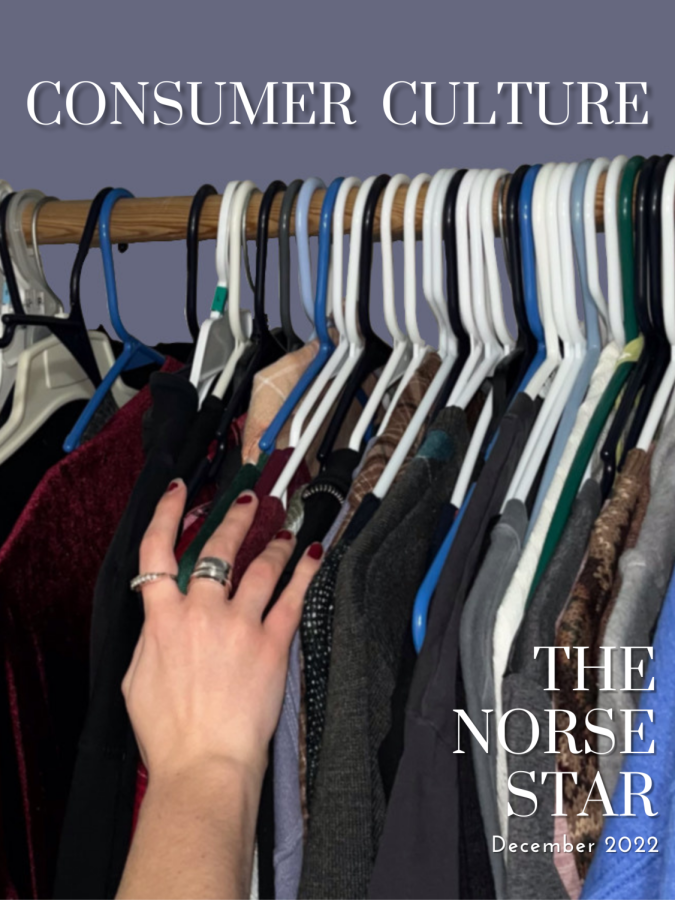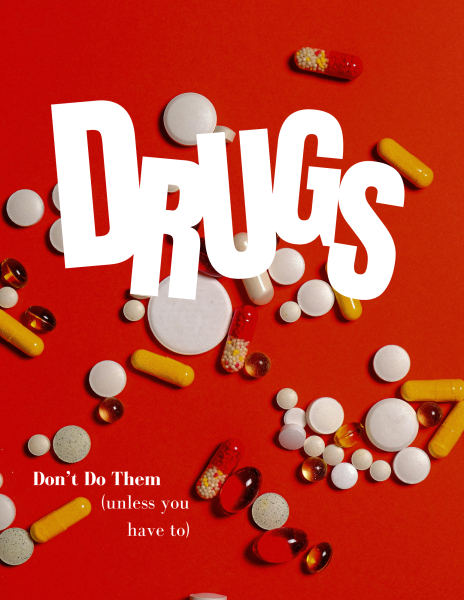Consumer Culture
Consumerism: the drive to own, buy, and define one’s identity through possessions. We’ve all experienced it. From the seemingly never-ending influx of sale emails in our inboxes to the constant stream of advertisements across all of our screens, consumerism plays a considerable role in our society whether we recognize it or not. The role of shopping is transactional, something we do everyday, something we must do to survive. Except during the holiday season when, all of a sudden, there’s a huge focus on gifts. The flood of Black Friday advertisements and the various, neverending pre and post-Christmas sales vie for our attention, begging us to spend more. The temptation to take advantage of these strategic sales is greater than ever and daunting in effect. There are so many options paired with a greater pressure to buy, buy, buy. But how does this dynamic affect us around the holidays and beyond? From its effect on our mental health, economics, the environment, and much more, it’s undeniable that consumerism’s impact on us is immeasurable. But what makes consumerism so successful? How has consumerism been able to become so ingrained in our culture and economy?
According to Ann Ross, the Business and Marketing teacher at Stoughton High School, the reason for consumerism’s success is marketing.
“The whole point with marketing is to promote products and to do one of three things: inform somebody of new products or services, persuade somebody who’s already aware to buy that [product or service], or to remind somebody who already knows about it,” Ross says.
But how does marketing reach consumers and convince them to make a purchase?
According to Ross, companies will use a technique called advertisement themes to create successful marketing campaigns. These advertisement themes are designed to reach the target customer demographics of a certain brand. When they are successful, they will make a connection with a consumer and secure a sense of loyalty to their brand.
Some examples of prominent advertisement themes are humor, celebrity endorsement, relatability, and also safety, an advertisement theme that took off with the emergence of the COVID-19 pandemic, according to Ross.
“All of a sudden, we weren’t selling funny [advertisement themes anymore.] It seemed really inappropriate to be funny,” Ross says. “If you look at the Superbowl commercials before COVID, it was Budweiser; it was E-Trade, it was Doritos; [the commercials were] all funny. And then with COVID, it was Mercedes Benz, Volkswagen, Subaru–safety, we’re selling you safety. It was Clorox wipes; ‘we’re selling you health.'”
Marketing, as explained by Ross, relies heavily on our actions as consumers.
“All of marketing is consumer behavior patterns,” Ross says.
This means that, as consumers, brands are expected to adapt to us, to our changing wants, needs, and values.
In today’s economy, successful marketing doesn’t only adapt to consumers’ values and the landscape of the current world, but it also creates competition.
“We live in a society where we feel pressure to have to keep up with the ‘neighbors,’” Ross says, using air quotes as she speaks.
By saying ‘neighbors,’ Ross refers to other consumers.
“[The ‘neighbors’] got a new BMW; I’m getting a Mercedes. They got a new house; we’re getting a pool,” Ross says.
Toni Fischer, social studies and psychology teacher at SHS, backed Ross’s words as she discussed the consumerist mind.
“Psychologically, we want to make sure that we’re keeping up with everybody else,” Fischer says. “We might not necessarily be consciously thinking, ‘Hey, I need this’, but in the back of our head, we’re keeping track and making a list of who has what.”
One modern invention that has affected consumerism more than anything is the internet, which has revolutionized not only the way we connect with each other, but also the way that we shop.
“I think that technology has put us in a place where we want everything so quick; we want it now,” Ross says. “And sometimes we don’t really pay attention to who we might be stepping on to get it.”
Since shopping has modernized, so have corporations. One of the biggest corporations in the world, Amazon, is a prime example of this.
“Amazon put us on a whole different level with shopping because they made it quick. They made it easy, and they made [shipping] free with Prime. […] If people don’t shop online, it’s either too complicated or too expensive with shipping, and Amazon addressed that,” Ross says. “That’s what a successful company does—they look at potential threats and turn them into opportunities.”
Although the internet, especially companies such as Amazon, have made shopping much easier for the average consumer, Ross points out that this convenience is not always a good thing.
“I think we’ve gotten to a place where we’re putting more value on things than people,” Ross says. “It’s way too easy for somebody to click ‘buy.’”
The effects of consumerism are not only detrimental to people but to the environment as well. One example that Ross shared was the purchasing of soda packs held together by plastic.
“Now we know that our wildlife is […] getting caught in those plastic things, and it’s killing [them.] So why hasn’t a company developed a disintegrating product?” Ross says. “We have tennis shoes being made out of recycled plastic; we have clothing made out of recycled plastics and cardboard and other materials. I think that the problem with that, I have no doubt, is it’s more expensive. So [companies] try to do it at the least possible cost so they can maximize their profit. And that’s where we get in trouble.”
Although Ross places some blame on corporations, she can acknowledge the impact consumers have on these problems as well.
“We wouldn’t have the problem if the companies didn’t make [them]. But the companies wouldn’t make [these problems] if people didn’t want [them],” Ross says.
Although consumerism has an undisputed impact on our lives, Aziza Jones, Assistant Professor of Marketing at UW-Madison since June of 2021, argues that consumerism does not create a solely negative impact on our lives. It has its upsides, too.
According to Jones, consumerism is not something we want to avoid. Rather, it’s something that humans have done for thousands of years.
“If you think back to our earliest human ancestors, they would give gifts or bring things to each other to [show] respect and admiration for one another; and we do the same thing in the modern era,” Jones says. “Being a consumer […] is just innate in our humanity. We give things to those that we love, and we like acquiring things that help make our lives easier.”
Even though humans have practiced the exchanging of items for thousands of years, there are still negative effects, especially in the modern age of consumerism. However, Jones blames materialism as the main culprit, not consumerism, for these negative effects.
“I don’t know if [consumerism] is something that people would want to avoid. Now the pressure of materialism, on the other hand, is something that I certainly hope that we can avoid because it has certain negative consequences on the way that we live our lives and our ability to be able to connect with each other,” Jones says. “Some of the cons are that it can get a little bit out of control, especially as we deal with things like environmental consciousness. Producing products is helpful for how we live, but also takes a toll on the environment.”
Much like Ross, Jones also touches on the impacts the internet has on consumerism. The introduction of the internet has allowed consumerism to become easier, more accessible, but it’s also become a platform for the drawbacks of materialism as well.
“What’s been really helpful for consumers [with the internet] is being able to see and be mindful of different products that are available, but it’s also been really helpful in transmitting information about how fair or ethically-produced different products are,” Jones says. “[It puts a] bigger onus on [corporations] and how they’re producing their items because people are very vocal now. It’s easy to get a microphone because of the internet, it’s easy to find people who are interested in what you have to say, and if there’s a product that you felt was created unethically or [if] a company treated you poorly, it’s easier to be able to share that info with others.”
Jones argues that change starts with the individual shopper—that it is our responsibility as shoppers to shop ethically just as much as it’s corporations’ responsibility to provide ethically made goods. The reason for this? Customers make up the economy, not corporations, and corporations tend to respond to what the public is telling them that they value.
“I don’t think the average corporation has a larger responsibility [to be sustainable], I think they have an equal responsibility,” Jones says. “And the reason why I say equal is because […] average people are the ones that are making up the economy, right? We are the ones that are doing the shopping, and feel like it needs to start with us.”
As consumers we are what makes up the economy. During the holiday season we are crowded with seemingly bigger and gaudier sales, all vying for our attention, shopping habits are even more on our minds. Most of us are familiar with the bombardment of emails and social media ads during November and December. In a world where anything and everything you could ever need or want is at your fingertips? How do you navigate this season in a way that prevents consumption from consuming you?
Major corporations today present easy and affordable options for gift-giving and personal spending, thanks to the simplicity of online shopping. Little stands in the way of that tempting dopamine boost of adding something to your shopping cart. So why should you care about its source?
The ethics of shopping are seldom taught in school or seen in the real world; they are, more often than not, unbeknownst to the average consumer.
Ethical shopping is shopping with intention, only buying what you need, without excess, and sourcing from companies that do minimal harm to both the planet and their workers. In other words, companies that are not exploitative. While this might appear complicated, ethical shopping is a skill that can be easily learned and applied by the average consumer.
Donelle Scaffidi, board member of Sustainable Stoughton, a local organization aiming to inspire a more sustainable future and community, pitched the use of more critical thinking when shopping, especially when companies want so badly for you to purchase their goods using strategic marketing and push-of-a-button convenience.
“I try to minimize my impact,” Scaffidi says. “It’s all about balance.”
Scaffidi explained a time when she believed online shopping made a lot of sense.
“A personal anecdote from when I lived up North for seven years [was that] midway through my time there, Amazon started to become popular. I lived an hour away from the closest clothing store. […] I worked at a school, so there [were about] 80 people living all in this community together, with the students and the teachers, and we got so many packages delivered every day. […] It made [more sense] in terms of transportation, […] like fossil fuel use, […] to have a truck come to us and deliver our packages than it would be for 40 cars going out,” Scaffidi says.
In a survey of 138 students at Stoughton High School, 89.9% of polled students expressed that sustainability was either somewhat or very important to them when they shopped. Many of these students expressed that thrifting was a way that they shopped while still keeping sustainability in mind.
Even though shopping sustainably is preferred by a majority of the students surveyed at SHS, not everyone has the same opportunity to do so. Factors such as prices, sizing, and accessibility also come into play.
According to a Refinery29 interview with writer Gianluca Russo, “As someone in the plus-size fashion space, it’s nerve-racking to tag the brands I’m wearing on Instagram when I know that a majority of them are fast fashion. But the truth is this: That’s all I have,” Russo writes.
Sustainable shopping, albeit better for the environment, often comes with higher prices. Many don’t have enough money to buy an entirely sustainable and ethical closet, so fast fashion often becomes their only viable option. The same goes for people who do not fit in standard sizing—fast fashion may offer sizes that other stores, ones that sell more ethical and sustainable products, do not provide.
The poll indicated that 69.6% of respondents rarely, if ever, shopped fast fashion brands. From that same survey, 30.4% of polled students said they bought items from fast fashion companies at least once in the past. Reasons for this varied, with 39 students expressing that they shopped fast fashion because their products were less expensive, 13 students citing that these brands had clothes in their size, and 34 responding that their products fit their personal style better than more ethical brands.
One anonymous respondent said, “If I’m shopping online, the name brands are a safer option since third party or smaller vendors could be scams.”
Drawing again from the words of Scaffidi, as a consumer, part of the responsibility in terms of sustainability comes down to the choices we make as individuals.
“Consumers have a huge role in that they [can] say ‘No, we don’t want you to produce this product that is exploiting people, or that is extracting resources in an unsustainable way,’” Scaffidi says.
If looking to shop more ethically, larger brands or retailers that sell fast fashion are something to be wary of due to their mass produced and cheaply made items. Fast fashion brands like SHEIN have also been accused of using exploitative labor practices that benefit no one but those within their top management, promote overconsumption.
The website, Good On You, wrote an article review of the ethics of SHEIN.
“No stranger to controversy, in 2020 the brand was accused of selling offensive items. […] SHEIN has also been accused of stealing designs from small independent labels and printing out low-quality copies for a fraction of the price,” the article’s author Isobella Wolfe writes.
Sustainable shopping can be done in many ways. Many of those polled in the shopping survey at SHS wrote in saying that they thrifted, or rather bought clothes second hand. Thrifting’s rise to popularity also has to do with how cheap it is, therefore making it more accessible.
People get rid of clothes for a myriad of reasons: size, style, trends, and more. Perfectly good clothes often
find their way into landfills. However, this excess waste can be avoided through recycling.
“There’s a lot of social pressure to look a certain way. If you’re wearing tattered clothing, people are going to […] judge you,” Scaffidi says.
Another way that you can avoid clothing waste is simply by wearing clothes longer. Consumers can also shop more responsibly by supporting local businesses. These businesses don’t operate like major corporations, who, more often than not, contribute to the draining of our Earth’s resources, post-production waste, and practice poor labor conditions. Choosing to shop locally, further knits our community and creates abundance on a local scale.
Sarah Ebert, President of Stoughton’s Chamber of Commerce, backs this claim, sharing insight into how the Chamber supports local businesses; for example they provide resources and outside promotions for said businesses.
“We have a really big variety [of businesses], […] 211 members [total],” Ebert says. “We’ve had a lot of downtown areas that are businesses that have been vacant, so the fact that [our downtown is] full and [there’s such] diversity of what you can get downtown is really helpful and it draws in lots of people, not only from town, but from out of town [as well].”
According to Ebert, Stoughton’s businesses are essential to our local economy, and supporting said businesses creates a better economic environment for all of us.
“If one [business] thrives, we all thrive,” Ebert says.
Another advantage to shopping locally is the unique and thoughtful personal touch your purchases have. When shopping locally, there’s a story behind the gift that is tied to a special place and moment in time, unlike when purchasing from major corporations.
Like Ebert, Scaffidi agreed that the best gifts are often the most ethical.
Handmade gifts are unique with a kind of sentimental value that can’t be purchased. Attachment to items also encourages the recipient to keep that gift for longer and create less waste in turn. For example, you might keep a pair of socks your friend knit you longer than the ones you bought at the store.
Gift-giving also contributes to a cycle called the gift economy, as seen in Robin Wall Kimmerer’s essay, “The Serviceberry.”
“[Saskatoon trees use] the free raw materials of light, water, and air, they transmute these gifts into leaves and flowers and fruits […] which offer a feast for insects when it’s cold and rainy. The insects return the favor by carrying pollen. […] They create a relationship of exchange that benefits both,” Kimmerer writes in her essay.
Kimmerer is speaking metaphorically, but is explaining what can be learned from the patterns of the Earth and the relationships between its inhabitants.
“I accept the gift from the bush and then spread that gift with a dish of berries to my neighbor, who makes a pie to share with his friend, who feels so wealthy in food and friendship that he volunteers at the food pantry,” Kimmerer writes.
But on one of the original questions brought forth, why shop ethically? Why does it even matter?
“I believe our future survival depends on it. The way that we’re producing and consuming is not sustainable and the implications are that of our survival,” Scaffidi says.
A sustainable future is more necessary than most realize.
“When somebody makes a choice to live in a more sustainable way, you start to become more connected in a way. […] It’s given me a greater sense of connection and purpose, and it’s become more nourishing. I started, for example, with the issue of sustainability with food. [You can buy more] local food, [and] support local agriculture. […] I [became] more interested in hunting and gathering and starting to eat more wild foods. […] [Eating locally produced foods] can help address so many other issues, like with mental health and physical health. There’s so many sick people in our culture, and I think by being more connected in this way, it can help nourish our own bodies and our own spirits, too,” Scaffidi says
The next time you pull on a new sweater, order a package online, or buy the newest tech product to replace the old, keep marketing, psychology, and sustainability in mind. What made you buy this item–was it celebrity-endorsed? And why did you buy it now? Was it on sale? Do you really want it, or is it just convenient, an impulse buy? Could you have taken a more sustainable route, or is it even your responsibility as a shopper to keep ethics in mind while buying? Consumerism raises many questions, making a once simple transaction complicated.
Consumerism has pros and cons, meaning it cannot be easily classified as something entirely positive or negative. Yes, consumerism is something we depend on to survive, something humans have done for thousands of years, something that is ingrained in our culture whether we like it or not. However, according to those we interviewed, materialism and the overconsumption of goods can contribute to several problems regarding sustainability and our relationships with one another. As humanity has evolved, consumerism has adapted to it. Marketing and psychology have contributed heavily to this, creating a sense of relatability and competition to drive people to spend. Although many viewpoints on consumerism can be debated, one inarguable fact is that consumerism has left an immeasurable, lasting impact on not only the individual but on the world.

Madeline is a senior, and this is her third year on staff! She's the features editor and social media manager. She joined the Norse Star because she loves...






